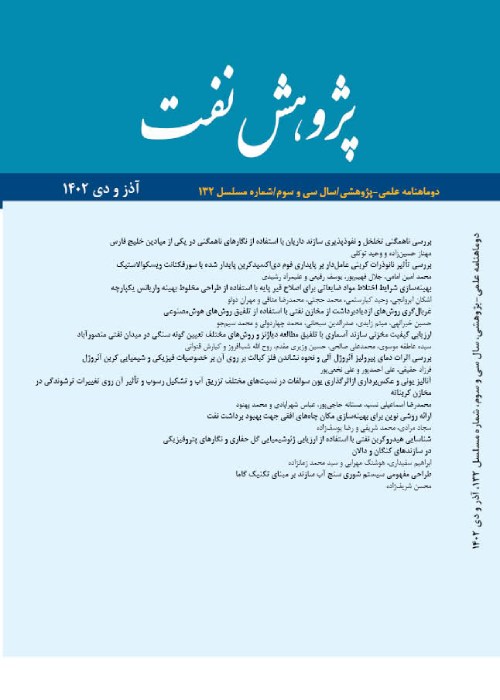Application of Organic Rankine Cycle for Energy Recovery and Optimization in Gas Compression Stations
Author(s):
Abstract:
The organic Rankine cycle (ORC) is a simple Rankine cycle with the use of an organic fluid instead of water. The fluid causes a heat recovery from lower temperature sources (biomass combustion, industrial waste heat, geothermal heat, solar ponds. etc.). The low temperature heat is converted into useful work that can itself be converted into electricity. An ORC contains a boiler, turbine condenser, pump, and sometimes a recuperator for improving the cycle efficiency. The focus of this study is to examine the ORC in the energy recovery of waste heat in a gas compression station with a 28 MW turbine in an area with a hot climate. The parts of a station with the enough potential are the waste heat of the exhaust gas from gas turbine. Using ORC in the heat recovery of exhaust gas is investigated in two forms of heat recovery: first, direct heat recovery in two scenarios of saturated and superheated expansion and secondly indirect heat recovery (using an oil internal cycle). The investigated working fluid is normal pentane. Produced work, thermal efficiency, Lorenz efficiency, and specific work are the parameters which are investigated related to the increase of the outlet temperature of the exhaust gas from the evaporator. The minimum temperature that the exhaust gas can be cooled down is limited due to the dew point temperature of exhaust gas and minimum approach temperature of heat exchangers. The evaluation is performed using first and second laws of thermodynamic. The first law and dew-point analysis illustrated that the exhaust gas could be cooled to 40 °C plus 80 °C for more safety. The results show that the cycle of superheated expansion scenario is more suitable for the heat recovery of the exhaust gas. From a thermodynamic point of view, using all the potential of the exhaust gas is better. Using ORC increases the efficiency of the station from 26% to 40%. In addition, in this paper, exergy analysis with the method of exergy graph is performed in order to evaluate the performance of the cycle in heat recovery. The results show that, in this case study, evaporator has the maximum and pump has the minimum influence on the system. Finally, the economic analysis of the heat recovery in superheated scenario is investigated and, for the investigated station, using an ORC system for the heat recovery of the compressed gas with high temperature is not recommended due to the low efficiency, and it is not economic.
Keywords:
Language:
Persian
Published:
Petroleum Research, Volume:25 Issue: 85, 2016
Pages:
48 to 63
magiran.com/p1532210
دانلود و مطالعه متن این مقاله با یکی از روشهای زیر امکان پذیر است:
اشتراک شخصی
با عضویت و پرداخت آنلاین حق اشتراک یکساله به مبلغ 1,390,000ريال میتوانید 70 عنوان مطلب دانلود کنید!
اشتراک سازمانی
به کتابخانه دانشگاه یا محل کار خود پیشنهاد کنید تا اشتراک سازمانی این پایگاه را برای دسترسی نامحدود همه کاربران به متن مطالب تهیه نمایند!
توجه!
- حق عضویت دریافتی صرف حمایت از نشریات عضو و نگهداری، تکمیل و توسعه مگیران میشود.
- پرداخت حق اشتراک و دانلود مقالات اجازه بازنشر آن در سایر رسانههای چاپی و دیجیتال را به کاربر نمیدهد.
In order to view content subscription is required
Personal subscription
Subscribe magiran.com for 70 € euros via PayPal and download 70 articles during a year.
Organization subscription
Please contact us to subscribe your university or library for unlimited access!


